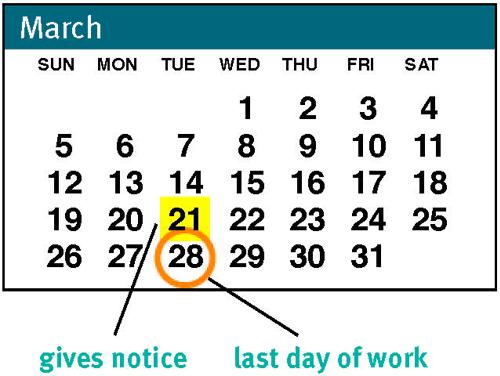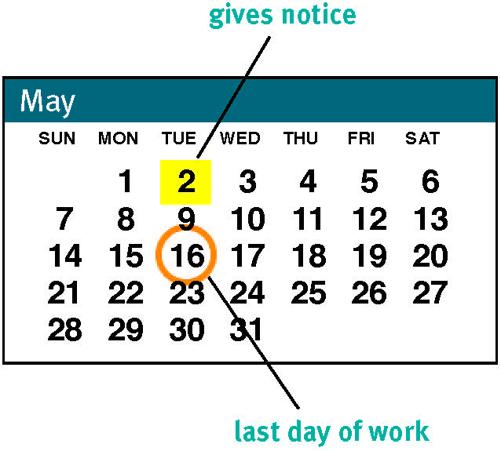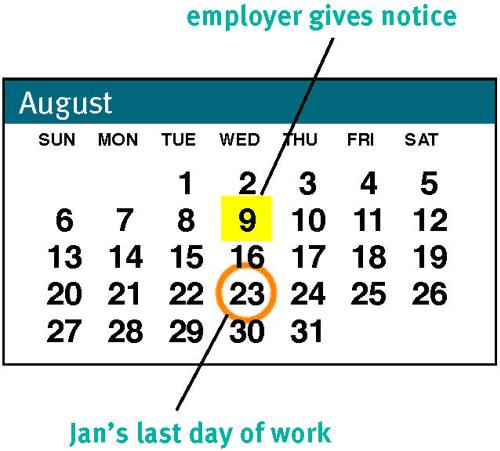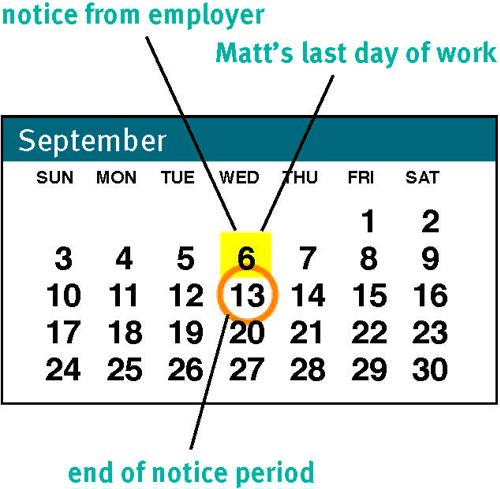
Workers leave their jobs for different reasons. Some workers quit their jobs. Others are laid off. Some workers are fired.
Do you see red words on this page? Click or tap these words to learn what they mean. Or visit the Easy Reading Dictionary.
Employers and workers must follow certain rules when a job ends.
What happens when you quit your job?
You may want to quit or leave your job. What do you need to do?
Most workers must give notice in writing to their employer. To give notice means to tell or warn a person that you will do something. For example, you can give your employer a 2-week notice in writing that you want to leave your job. That means you will leave your job in 2 weeks. The 2-week time is your notice period.
After you give notice, you must work to the end of the notice period. Your employer must keep paying you for working to the end of the notice period.
How much notice must you give?
This depends on how long you worked at the company. If you have worked:
- 90 days or less, you do not need to give notice
- More than 90 days, you need to give 1 week of notice
- 2 years or more, you need to give 2 weeks of notice
Examples
No notice. Kareem decides to quit his job. He has worked at his job for 2 months. He does not have to give notice. Kareem can stop working right away.
1 week of notice. Astur has worked at her job for 1.5 years. She decides to quit. She must give 1 week of notice.

Astur wants to stop working on March 28. So she gives her employer notice in writing on March 21. She will work her regular hours until March 28. She puts her notice in writing:
March 21, 2019
Dear Mr. Jones,
I have enjoyed working here. But my family and I are moving away. Friday, March 28, will be my last day of work.
Sincerely,
Astur Ali
2 weeks of notice. Oki has worked at his job for 6 years. He decides to quit. He must give 2 weeks of notice.

Oki wants to stop working on May 16. So he gives his employer notice in writing on May 2.
Sometimes, you do not have to tell your employer that you are quitting. See Termination by employee to learn when you do not have to give notice and for other rules about quitting.
What happens when you are laid off or terminated?
If you are laid off or terminated it could be because there is no work. When this happens, it is not your fault.
Sometimes, you are laid off for only a short period. You may be called back. This is called a temporary layoff. A temporary layoff usually cannot be longer than 60 days in a 120-day period.
Your employer must follow work laws when you are laid off or terminated. They must tell you in writing before you get laid off or are terminated. How much notice depends on how long you worked at the company. Some employers give extra notice to their workers.
How much notice must employers give to temporarily lay you off?
This depends on how long you have worked at the company. If you have worked:
- Less than 2 years, your employer must give you at least 1 week of notice
- 2 years or more, your employer must give you at least 2 weeks of notice
How much notice must employers give to terminate (end) your job?
This depends on how long you have worked there. If you have worked:
- 90 days or less, your employer does not have to give you notice
- More than 90 days but less than 2 years, your employer must give you at least 1 week of notice
- 2 years or more but less than 4 years, your employer must give you at least 2 weeks of notice
- 4 years or more but less than 6 years, your employer must give you at least 4 weeks of notice
- 6 years or more but less than 8 years, your employer must give you at least 5 weeks of notice
- 8 years or more but less than 10 years, your employer must give you at least 6 weeks of notice
- 10 years or more, your employer must give you at least 8 weeks of notice
Even if your layoff is temporary, you must get notice in writing.
For most types of work, if your layoff is not temporary, your employer must give you notice. For some types of work, like seasonal or casual work, your employer does not have to give you notice.
Sometimes a temporary layoff ends and you are not called back to work. Then you must get termination pay.
Workers get their regular earnings during the notice period. Workers often work until the end of the notice period.
Sometimes, an employer asks a worker to stop working right away. But the employer must pay the worker’s wages until the end of the notice period. This is called termination pay.
Examples
Jan works at a coffee shop. On August 9, her employer says, “Sorry Jan. Business is slow. I have to let you go. Here is your notice.”
Jan has worked at the coffee shop for 3 years. Her boss gives her 2 weeks of notice.
Jan’s job will end in 2 weeks. She will work her regular hours for the notice period. Her last day of work is August 23.

Matt works at a garage. He has worked there for 1 year.
One day, Matt’s employer says, “I have too many workers. I do not have a job for you anymore. Here is your 1-week notice. I want you to leave today.”
Matt will stop going into work right away. But he will get his regular earnings for the notice period. These earnings may be called termination pay on Matt’s pay stub.

What happens when you get fired?
If you are fired, it could be because you did something wrong at work.
To fire you, the employer has to have just cause. This means the employer must have a good reason to fire you. The employer must have proof of that reason.
For example, an employer can fire a worker who:
- Stole money or tools
- Hit or bullied another worker
- Told secrets about the employer
- Was often late for work
For some problems, the employer must warn a worker about the problem. The warning must be in writing.
Example
Jun works in an office. She was late 5 times in May.
Her employer talked to Jun about the problem. He also gave her a warning letter each time she was late. He has copies of the letters. The last letter said, “I will fire you if you are late 1 more time.”
1 week later, Jun slept in and was late for work. Her employer fired her. He had just cause.
If there is just cause, an employer does not have to give notice. The employer can just fire a worker. The worker must leave right away. The worker does not get any termination pay.
The law protects you and your employer
The laws about leaving your job can seem complicated. If you leave your job, make sure you give your employer enough notice. And if you lose your job, make sure your employer respects your rights. See Termination by employer to learn about your rights and your employer’s rights if you are fired.

